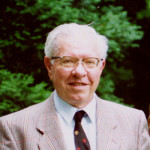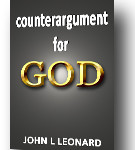
Fred Hoyle
Some super-calculating intellect must have designed the properties of the carbon atom; otherwise the chance of my finding such an atom through the blind forces of nature would be utterly minuscule. A common sense interpretation of the facts suggests that a super-intellect has monkeyed with physics, as well as with chemistry and biology, and that there are no blind forces worth speaking about in nature. The numbers one calculates from the facts seem to me so overwhelming as to put this conclusion almost beyond question. — Fred Hoyle
Sir Fred Hoyle was probably the most brilliant scientist of the 20th century who never became world famous. He was the man who coined the term “big bang” to describe the small, incredibly hot beginning of the universe.
However, Sir Fred was ridiculing the theory because he rejected the Big Bang. Hoyle didn’t believe an origin of the universe was possible, probably due to his atheism. Even after the discovery of cosmic microwave background radiation supported Hubble’s observations of redshift, which indicated the universe not static, but expanding.
In the quote above, Hoyle is referring to his prediction about the carbon 12 atom, which was an extraordinary accomplishment, for which fellow physicists William Alfred Fowler and Chandra Wickramasinghe won the 1983 Nobel Prize in physics.
Hoyle was famously snubbed and excluded from sharing the honor he so richly deserved, allegedly because he alienated and annoyed so many of his peers with his more controversial opinions.
Author Simon Singh wrote the following about Hoyle:
After ten days of analyzing the carbon-12 nucleus, Fowler’s team found a new excited state. It was at 7.65 MeV, exactly where Hoyle said it should be. This was the first and only time a scientist had made a prediction using the anthropic principle and had it proved right. It was an instance of extreme genius.
The anthropic principle basically says that the universe has cosmological factors that have been fine-tuned to support living, conscious observers — in other words, creatures like humans.
Hoyle annoyed people because he was brilliant and inconsistent in his thinking.
He harshly criticized Darwin and evolution theory in favor of intelligent design, but Hoyle favored the idea of panspermia caused by extra-terrestrial beings over creation by a supernatural God, famously suggesting that accidental abiogenesis was about as likely as a tornado tearing through a junkyard and producing a fully functional jet airplane as the result, calculating that the odds against such a phenomena were 1 in 10^40,000.
A “super-calculating intellect” — yet Hoyle could never bring himself to call this intellect “God.”
If Hoyle had accepted the evidence for the Big Bang, he would have realized the fatal error in his logic, which I endeavored to explain in my book Counterargument for God.
The Creator of this fine-tuned universe, the Intelligent Designer of all life, cannot possibly be part of a universe that had an origin.
God cannot merely be extra-terrestrial, like E.T.
God must be extra-universal — meaning literally not of this universe.

Speak Your Mind